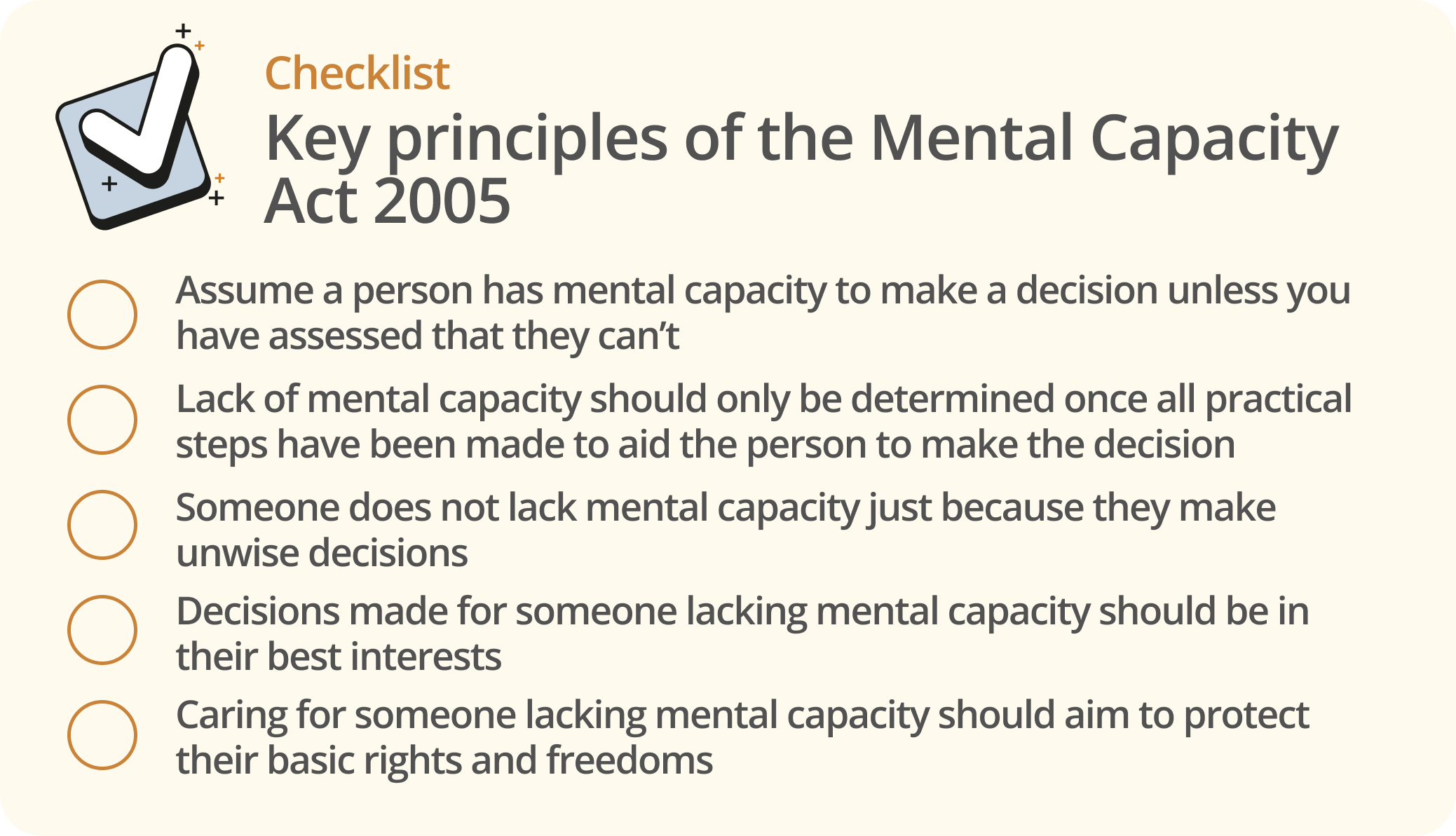What is mental capacity?
Mental capacity is defined as the ability of a person to make a specific decision at the time it needs to be made. Someone is considered to have capacity if they can understand relevant information and retain it for long enough to decide. They should be able to weigh up the pros and cons of the decision and then communicate it effectively.
It is important to remember that mental capacity can fluctuate in the case of dementia as someone may be able to make some decisions but not others or have days where they are more coherent before taking a downturn. Assessing someone's mental capacity is very important, and the MCA guides how this should be conducted to protect the rights of the individual, whilst still ensuring their safety.
The key principles of the MCA
The MCA is built on five key principles. It assumes that every adult has mental capacity unless proven otherwise. It states that all practical steps must be taken in order to help someone make their own decisions, and that making what could be considered to be an unusual or risky decision does not automatically mean that the person is lacking in mental capacity.
It is also important that any decision which is made on behalf of someone who is deemed to lack mental capacity must be in their own best interests and any actions should limit the person's rights and freedoms as little as possible.
These principles have been put in place to ensure that individuals with conditions like dementia are still involved in decisions about their lives as much as possible.

How is mental capacity assessed?
Assessing someone's mental capacity must be done extremely carefully and so the MCA outlines a two-stage test that should take place. This should begin with a diagnostic test that looks at whether the person concerned has an impairment of or a disturbance in the functioning of their mind or brain. This could take the form of dementia as well as something like a brain injury or mental health condition or any other permanent or temporary incapacity.
Once this has been established, next there should be a functional test that assesses whether the impairment means the person is unable to understand the information needed to decide or retain it long enough to make that decision. It will test their ability to weigh up the information to make a decision and how they are able to communicate it through speech, sign language or gestures (or in any other way).
The mental capacity assessment should be conducted by a healthcare professional, such as a doctor or social worker, especially when it comes to significant decisions about a person's health or finances. Family members and carers can have some input by providing context or supporting communication but are not in a position to conduct the assessment themselves.
It is important that, throughout the process, clear records of the assessments are kept detailing why this person is believed to lack capacity and how decisions have been made in their best interests.
It’s important to note that a capacity assessment applies to a specific decision being made at a specific moment in time. For example, at a given time, somebody might have capacity to make one specific decision and not another. Similarly, somebody may lack capacity to make a given decision one day yet have capacity to make that decision the following day – when a decision isn’t urgent, sometimes delaying the and re-checking capacity later is in the person’s best interests. This is likely to be applicable in the context of dementia care.
What happens if someone lacks capacity?
If an individual has been deemed to lack mental capacity, then decisions must be made in their best interests. It is important that their past and present wishes, feelings and values are taken into consideration during every decision and, where appropriate, there should be input from family, friends and carers who know the person well.
It may be necessary to create a Lasting Power of Attorney (LPA), a legal document that allows a trusted individual to make decisions on behalf of someone who lacks the mental capacity to do so themselves. A Health and Welfare LPA covers decisions about their medical care, daily routine and living arrangements, whilst a Property and Financial Affairs LPA covers decisions about their money and property.
Without an LPA, the Court of Protection may appoint a deputy to make these decisions. It is advisable to set up an LPA while the person concerned still has capacity, but you should speak to a solicitor before embarking on this process
Common challenges and ethical considerations
One of the most challenging aspects of determining mental capacity is the issue of fluctuating capacity. Those suffering from dementia will find that their condition varies from day-to-day and so ongoing assessments might be required. It is also important to ensure that autonomy and safety are balanced so that a person's independence can still be respected whilst ensuring their safety. All decisions that are made should reflect the individual's cultural background, beliefs, and personal values.
One of the biggest difficulties can be with family disagreements, as not everyone will agree on what is in a loved one's best interests. This can complicate decision making and can often lead to families pursuing a legal route to resolution.
It is important to understand how mental capacity is assessed in dementia care to ensure that all decisions are made fairly, respectfully and legally. The Mental Capacity Act 2005 has set out some very clear guidelines to help in these kinds of situations so that the wishes of the individuals are always upheld whilst taking their health and safety into account.
Whenever the question of mental capacity is addressed, it is essential that each situation is dealt with using compassion and sensitivity. It can lead to a number of complex situations in regard to legal concerns as well as healthcare, so it is vital that the advice of professionals is always sought.
If you need help regarding legal decisions or concerns about mental capacity, you can Ask a lawyer.




